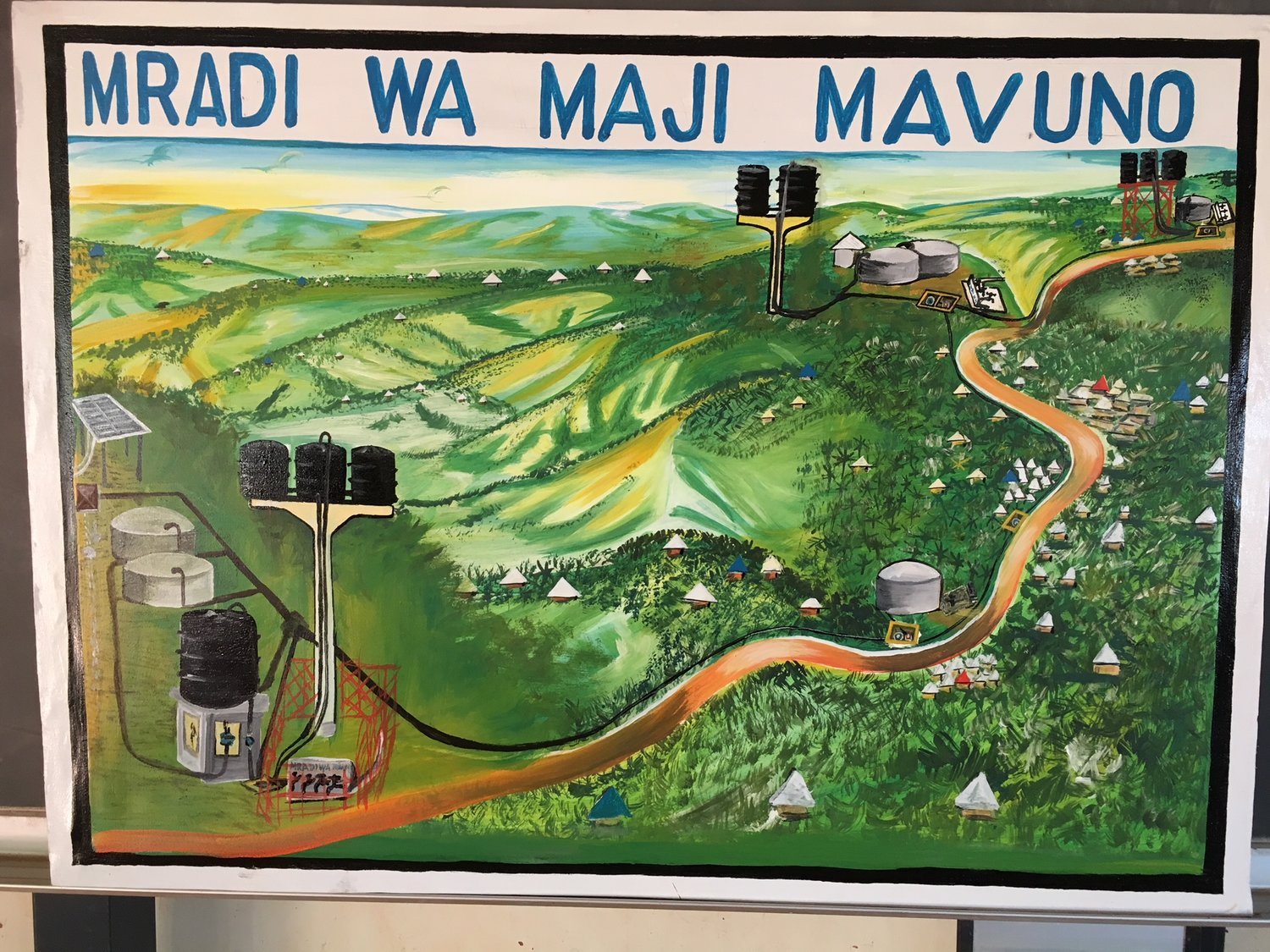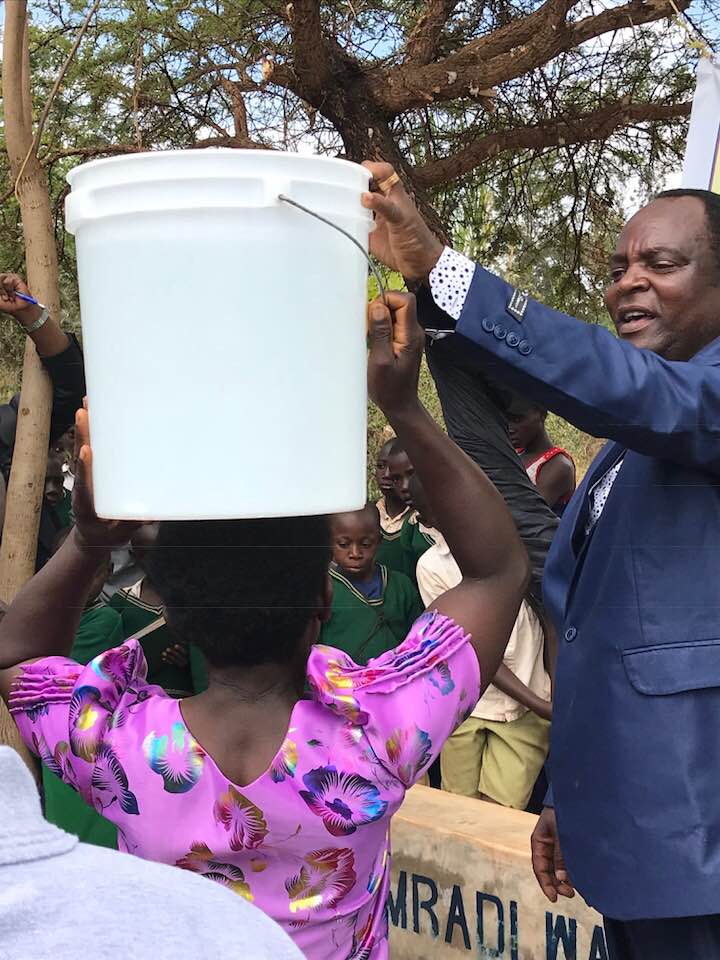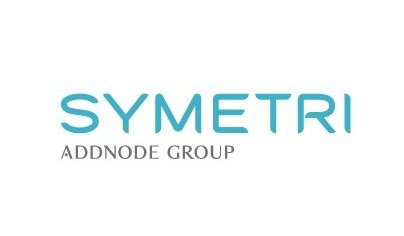Supplying villages with water in Tanzania
The communities in the Northwestern part of Tanzania experience an extreme water situation. Children and women have to walk hours to reach far-distant natural water sources usually dirty or of poor quality leading to various health issues for the citizens. In 2017, we initiated a project to improve the water and sanitation conditions in three villages - Ilhanda, Rukople and Chonoyono - and a boarding school to supply with water for drinking, cooking and personal hygiene.
Drawing of the water system in place
2017-2018 > Phase 1: ensuring clean water access
The first phase aimed to ensure clean water access, storage and distribution among the communities. Different solutions were studied, including drilling new boreholes in a valley close to Chonyonyo. The risk of not finding water in combination with the cost involved the discussion shifted toward using a borehole in Ihanda. The Ilhanda borehole demonstrated to be a sustainable source of clean water that could also supply the two villages of Chonyonyo and Rukole.
The study phase led to the installation of a full water supply system including an additional solar-powered water pump. The water pump complemented the existing one in Ihanda run by electricity and pumping water out of the source 120 meters below ground. We also implemented the construction of a water pipeline from Ihanda to Chonyonyo and 10 km up the hills, the 5m3 water tanks and tap stations were installed.
Two tanks were installed in Rukole and three water tanks in Chonyonyo, designed to fit the daily consumption of water for the villages. We also installed an instrument to follow up on the level of water in the borehole over time, to ensure long-term operation.
The water is now collected from three taps by the villagers, mainly the girls who carry the water back home in cans, benefiting over 5,000 people. In addition to the fact that the distance to fetch water has decreased the water is cleaner than the water collected in natural open water sources, which reduces the risk of diseases.
The completion of this phase was an important milestone for the project and was celebrated with an official inauguration.
inauguration - getting the first water to the COMMUNITY
District Commissioner lifting a full water bucket on the head of a woman at the inauguration
2020 > Phase 2: rephrasing our action to respond to the pandemic
WATER ACCESS AT RUICHO DISPENSARY
Througout 2019 and 2020, our partner local grassroots organization for this project - Mavuno - continued to draw smaller pipelines to villages in the vicinity.
As the pandemic hit, EWB-SWE was asked by the District Council in April 2020 to support the further extension of the pipeline to a dispensary in Ruicho - 2,2 km further away from Chonyonyo. The pipeline installation was performed by the District Council and partly funded by EWB-SWE. The health station serves 30-40 patients per week, with a catchment population of 10,750 people.
2021-2022 > Phase 2.2: ensuring the continued functionality of the water pipe
From start, the main challenge of this project has been to secure the continuity of the system. Driven by an unreliable national grid, the water pump in the borehole pumped water to the system during the daytime and into the tanks at Ihanda at night. Reaching the end of its lifetime, the pump risked breaking down anytime, therefore compromising the continued functionality of the system. Additionally, the tanks at Ihanda quickly emptied when the grid power dropped, making the available quantity of water uncertain.
This phase of the project therefore aimed to replace the old pump with a new/additional solar-powered pump integrated into the system built during phase 1.
As the old pump developed a fault and failed sooner than anticipated, it was replaced in September 2021 thanks to the swift action from the project team. An outstanding effort from the team was in getting a new installation in place the day after the pump failed. In addition, a new level sensor (a diver) was installed to monitor the level of water in the tank. This summer, the last remaining portion of our project was implemented with the installation of the solar panels now providing a sustainable and safe supply of energy to secure the long-term functioning of the water supply system for the villages.
Local team installing the new water pump
COmpleted solar structure
Project partners
Mavuno Project
Mavuno Project is a non-profit organization aiming to strenghten the local communities and improve the quality of life in the rural areas of Karagwe and Kyerwa in Northwestern Tanzania.
Ramboll Foundation
The Ramboll Foundation is an independent Danish enterprise foundation with philanthropic obligations.
Bengt Dahlgren
Bengt Dahlgren is a privately-owned technical consultancy company active within the field of civil engineering and providing qualified engineers in a variety of disciplines, including installation, fire & risk, building & property, and energy & environment.
Symetri
Symetri supports innovative companies in the building, infrastructure and manufcaturing industry to optmize their working methods and increase the quality of their projects.
HeidelbergCement
HeiderlbergCement is one of the wolrd’s largest and fully integrated building materials companies manufacturing cement, aggregates, ready-mixed concrete and precast concrete products.
Phase 2 of the project also received financial support from Ericsson, Dassault Systemes, SSAB and Septek.
















